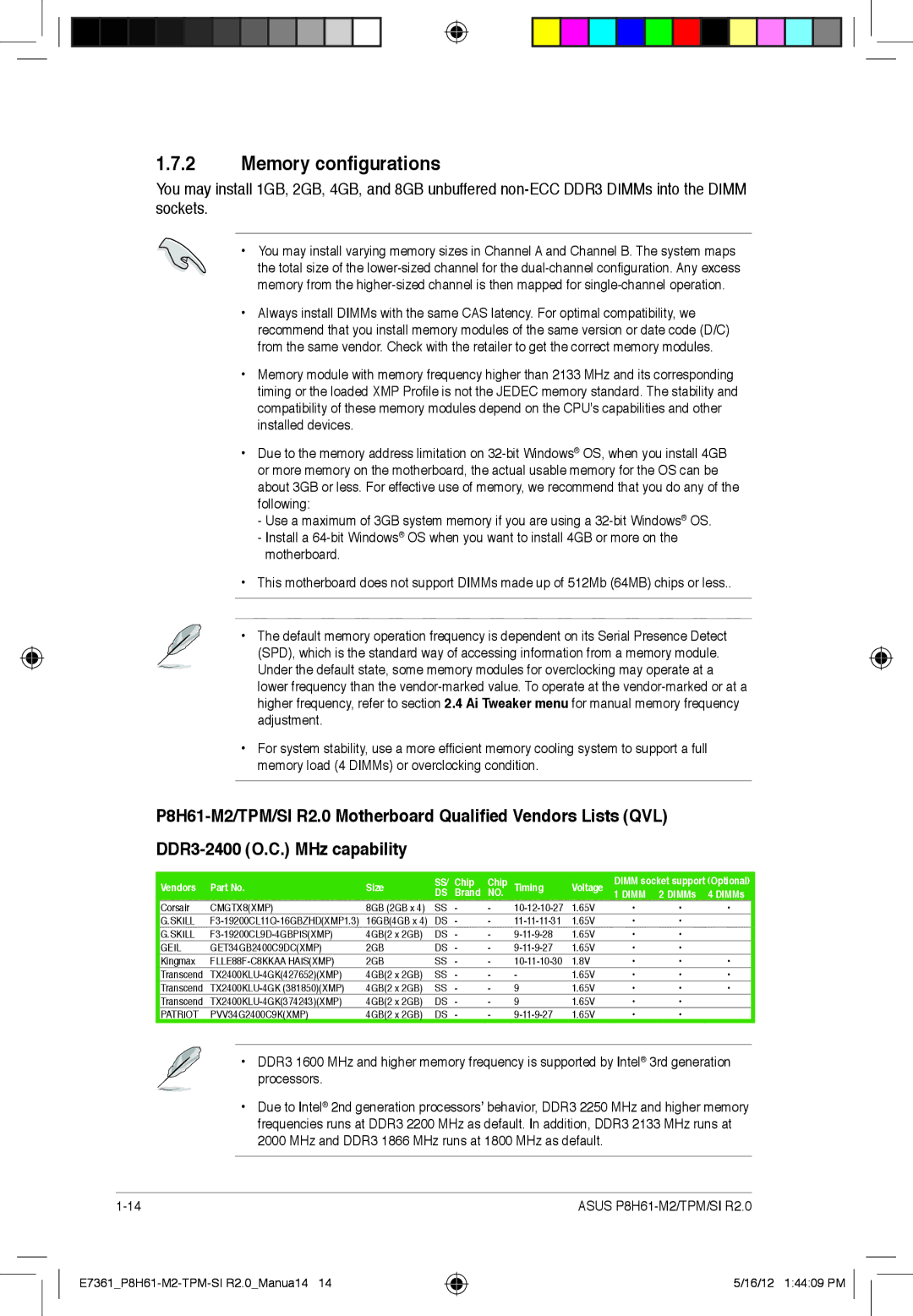
1.7.2Memory configurations
You may install 1GB, 2GB, 4GB, and 8GB unbuffered non‑ECC DDR3 DIMMs into the DIMM sockets.
• You may install varying memory sizes in Channel A and Channel B. The system maps the total size of the
•Always install DIMMs with the same CAS latency. For optimal compatibility, we recommend that you install memory modules of the same version or date code (D/C) from the same vendor. Check with the retailer to get the correct memory modules.
•Memory module with memory frequency higher than 2133 MHz and its corresponding timing or the loaded XMP Profile is not the JEDEC memory standard. The stability and compatibility of these memory modules depend on the CPU's capabilities and other installed devices.
•Due to the memory address limitation on
-Use a maximum of 3GB system memory if you are using a
-Install a
•This motherboard does not support DIMMs made up of 512Mb (64MB) chips or less..
• The default memory operation frequency is dependent on its Serial Presence Detect (SPD), which is the standard way of accessing information from a memory module. Under the default state, some memory modules for overclocking may operate at a lower frequency than the
•For system stability, use a more efficient memory cooling system to support a full memory load (4 DIMMs) or overclocking condition.
Vendors | Part No. | Size | SS/ | Chip | Chip | Timing | Voltage | DIMM socket support (Optional) | ||
DS | Brand | NO. | 1 DIMM | 2 DIMMs | 4 DIMMs | |||||
Corsair | CMGTX8(XMP) | 8GB (2GB x 4) | SS | - | - | 1.65V | • | • | • | |
G.SKILL | 16GB(4GB x 4) | DS | - | - | 1.65V | • | • |
| ||
G.SKILL | 4GB(2 x 2GB) | DS | - | - | 1.65V | • | • |
| ||
GEIL | GET34GB2400C9DC(XMP) | 2GB | DS | - | - | 1.65V | • | • |
| |
Kingmax |
| 2GB | SS | - | - | 1.8V | • | • | • | |
Transcend | 4GB(2 x 2GB) | SS | - | - | - | 1.65V | • | • | • | |
Transcend | 4GB(2 x 2GB) | SS | - | - | 9 | 1.65V | • | • | • | |
Transcend | 4GB(2 x 2GB) | DS | - | - | 9 | 1.65V | • | • |
| |
PATRIOT | PVV34G2400C9K(XMP) | 4GB(2 x 2GB) | DS | - | - | 1.65V | • | • |
| |
• DDR3 1600 MHz and higher memory frequency is supported by Intel® 3rd generation processors.
•Due to Intel® 2nd generation processors’ behavior, DDR3 2250 MHz and higher memory frequencies runs at DDR3 2200 MHz as default. In addition, DDR3 2133 MHz runs at 2000 MHz and DDR3 1866 MHz runs at 1800 MHz as default.
ASUS |
5/16/12 1:44:09 PM
